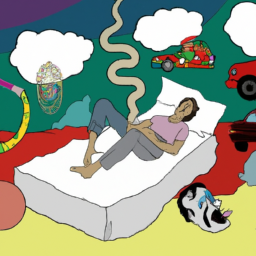I have always been intrigued by dreams. They can be incredibly vivid and surreal, but upon waking up, I often find it difficult to recall them. It is frustrating to feel like I have had an amazing experience, only to have it fade away completely upon waking up.
The answer lies in the science behind dreaming. Our brains are incredibly complex, and while we sleep, they’re busy processing information, consolidating memories, and regulating emotions. Dreams are a natural part of this process, but they’re not always easy to remember.
In this article, we’ll explore why we forget our dreams, some tips for improving dream recall, and the benefits of remembering our dreams.
Key Takeaways
- Dreams are vivid and strange, but difficult to remember upon waking up due to intense brain activity during REM sleep and different brain activity patterns during sleep.
- Forgetting dreams is a normal process due to neurotransmitters like acetylcholine and norepinephrine affecting the transfer of memories from short-term to long-term memory.
- Prioritizing sleep hygiene by establishing healthy sleep habits can improve dream recall and support mental health.
- Keeping a dream journal can improve dream recall by reinforcing memories in the mind and telling the brain that remembering dreams is important, leading to deeper understanding of oneself through dream exploration.
The Science Behind Dreaming
Did you know that the brain is actually more active during REM sleep, which is when most dreaming occurs? During this stage, the brain sends signals to various parts of the body, including the eyes, which move rapidly back and forth, giving it the name ‘Rapid Eye Movement’.
The intense brain activity during REM sleep is thought to be responsible for the vivid and often bizarre nature of our dreams. Despite the heightened brain activity during REM sleep, we often have difficulty remembering our dreams upon waking up.
This is because the brain’s activity patterns during sleep are different from those during wakefulness, and it can be difficult to store and retrieve memories from the dream state. In the next section, we will explore some of the reasons why we forget our dreams upon waking up.
Why We Forget Our Dreams
I often wonder why I can’t remember my dreams when I wake up. As I researched this, I found out that forgetting our dreams is a normal process that happens due to the consolidation of important memories.
Additionally, neurotransmitters like acetylcholine and norepinephrine play a vital role in the transfer of memories from short-term to long-term memory, which affects our ability to remember our dreams.
The Consolidation of Important Memories
When you go to sleep, your brain works to consolidate important memories from the day, but if you don’t get enough deep sleep, those memories may not be stored properly and you may not remember your dreams when you wake up.
This is because during deep sleep, the brain transfers memories from the short-term to the long-term memory storage, which makes them easier to recall later on. However, if you don’t reach this stage of sleep, your memories may not be consolidated properly, which can result in difficulty remembering your dreams the next morning.
To ensure that your brain has enough time to consolidate memories, it’s important to get a full night’s sleep. Additionally, there are other factors that can affect the consolidation of memories, such as stress and anxiety.
When you’re stressed, your brain may focus on consolidating negative memories and emotions rather than positive ones, which can make it harder to remember your dreams. In contrast, when you’re relaxed and calm, your brain is better able to consolidate positive memories, increasing the likelihood that you’ll remember your dreams in the morning.
As we move into the next section about the role of neurotransmitters, it’s important to note that these chemicals play a critical role in sleep and memory consolidation.
The Role of Neurotransmitters
Neurotransmitters play a critical role in both sleep and memory consolidation, with different chemicals affecting different stages of the sleep cycle. One of the most important neurotransmitters involved in memory consolidation is acetylcholine, which is most active during REM sleep. REM sleep is when most of our dreaming occurs, and studies have shown that inhibiting acetylcholine during this stage can reduce dream recall.
In addition, other neurotransmitters such as norepinephrine and serotonin also play a role in regulating sleep and memory consolidation. Despite the role of neurotransmitters in memory consolidation during sleep, the difficulty of retrieving dream memories remains a common experience.
This may be due to the fact that dream memories are often fleeting and not fully consolidated into long-term memory. Additionally, the brain may not prioritize the storage of dream memories in the same way as other types of memories, leading to a lack of recall upon waking. Regardless of the specific reasons for why we can’t remember our dreams, it is clear that the brain’s complex processes involved in sleep and memory consolidation play a significant role in this phenomenon.
The Difficulty of Retrieving Dream Memories
One may find it challenging to recall the details of their dreams due to the fleeting nature of dream memories and the brain’s prioritization of memory consolidation during sleep.
While we’re sleeping, our brains are busy processing and consolidating memories from the previous day. This process can interfere with the retrieval of dream memories, as the brain may prioritize the consolidation of other memories over dream memories.
Furthermore, dream memories are often stored in a different way than waking memories, which can make them more difficult to access. Dream memories are often less vivid and less detailed than waking memories, making them more susceptible to decay over time.
However, there are ways to improve dream recall, such as keeping a dream journal or setting an intention to remember your dreams before going to sleep. By actively working to improve dream recall, it’s possible to access and explore the fascinating world of our unconscious minds.
Tips for Improving Dream Recall
Funny thing is, the best way to improve dream recall is by simply getting enough sleep. It sounds too simple, but it’s true.
When you are sleep deprived, your mind is more focused on getting the rest it needs rather than retaining memories, including dream memories. So, the first step to improving your dream recall is to make sure you’re getting enough sleep on a regular basis.
Another tip that can help improve your dream recall is to keep a dream journal. By writing down your dreams as soon as you wake up, you’re reinforcing the memories in your mind. You can also look for patterns or recurring themes in your dreams, which can give you insight into your subconscious.
By keeping a dream journal, you’re also telling your mind that remembering your dreams is important to you. This will help your brain prioritize dream memory retention, making it easier to remember your dreams in the future.
With these tips, you can improve your dream recall and start reaping the benefits of remembering your dreams.
The Benefits of Remembering Dreams
I find the world of dreams to be absolutely fascinating. There’s something truly magical about how our minds can conjure up entire worlds while we sleep.
But beyond just being interesting, remembering our dreams can actually be incredibly beneficial for our mental health. By encouraging dream exploration and experimentation, we can gain a deeper understanding of ourselves and our subconscious minds.
The Fascinating World of Dreams
Do you ever wonder why you can’t recall your dreams upon waking up? Let’s explore the fascinating world of dreams and uncover the mystery behind this phenomenon.
Dreams are a fascinating and mysterious part of our lives. They’re often strange, surreal, and sometimes downright bizarre. Despite the fact that we spend a significant portion of our lives dreaming, researchers still don’t fully understand the purpose of dreams or why we have them.
So why can’t we remember our dreams when we wake up? Here are some possible reasons:
- Lack of sleep
- Distractions upon waking up
- Not enough attention paid to dreams
As we move onto the next section about the importance of sleep for mental health, it’s important to note that dreams play a crucial role in our overall wellbeing.
The Importance of Sleep for Mental Health
As someone who’s always been fascinated by the strange and mysterious world of dreams, I often find myself wondering why I can’t seem to remember them when I wake up in the morning. It’s frustrating to know that I’ve been experiencing these vivid, fantastical adventures all night long, only to have them slip away from my memory the moment I open my eyes.
But as it turns out, there may be a very good reason for our forgetfulness when it comes to dreams. According to sleep experts, the process of transferring information from short-term to long-term memory is disrupted during sleep, which can make it difficult for us to retain the details of our dreams upon waking.
This is especially true for those of us who don’t get enough sleep, as a lack of quality rest can further impair our ability to remember what we experienced in our dreams. So, in order to fully appreciate and explore the fascinating world of dreams, it’s important to prioritize getting enough high-quality sleep.
And that’s where the importance of sleep for mental health comes in. Not only does sleep deprivation make it harder for us to remember our dreams, but it can also have a significant impact on our overall mental and emotional well-being. Studies have shown that lack of sleep is linked to a higher risk of depression, anxiety, and other mood disorders, as well as decreased cognitive function and memory retention.
By prioritizing our sleep hygiene and making sure we’re getting enough restful sleep each night, we can not only improve our ability to remember our dreams but also support our mental health and well-being in general.
So, how can we encourage dream exploration and experimentation? Stay tuned for the next section.
Encouraging Dream Exploration and Experimentation
To fully embrace the mysterious world of dreams, it’s crucial to prioritize quality sleep and establish healthy sleep habits. This means creating a relaxing bedtime routine and setting a consistent sleep schedule. It also means avoiding caffeine and other stimulants before bed and limiting screen time in the hours leading up to sleep. By prioritizing sleep, we can increase the chances of remembering our dreams and exploring their meaning.
But once we’ve established healthy sleep habits, how can we encourage dream exploration and experimentation? One way is by keeping a dream journal. By writing down our dreams as soon as we wake up, we can better remember and analyze them. Another way is by practicing lucid dreaming, where we become aware that we are dreaming and can control the dream’s outcome. And finally, by discussing our dreams with others and seeking out interpretations, we can gain a deeper understanding of ourselves and our subconscious. By taking these steps, we can unlock the rich and fascinating world of our dreams.
| Dream Experimentation Tips | My Experience | Outcome | ||
|---|---|---|---|---|
| Keep a dream journal | I write down my dreams every morning | I am able to remember my dreams more vividly and analyze their meaning | ||
| Practice lucid dreaming | I have tried to become aware that I am dreaming | I have had a few successful experiences of controlling my dreams | ||
| Discuss dreams with others | I have talked to my friends and family about my dreams | It has sparked interesting conversations and helped me gain new insights into myself | Overall, exploring my dreams has been a fascinating and rewarding journey that has allowed me to tap into my subconscious and better understand my thoughts, feelings, and desires. |
Frequently Asked Questions
Can lucid dreaming techniques help improve dream recall?
Lucid dreaming techniques can improve dream recall by training the brain to be more aware in dreams. With practice, one can recognize dream signs and become more able to remember and recall dreams upon waking. A dream is a canvas for the mind.
Is there a correlation between certain foods and dream recall?
Certain foods, such as bananas and walnuts, contain high levels of tryptophan, a chemical that promotes sleep and can enhance dream recall. Incorporating these foods into my diet may improve my ability to remember dreams upon waking.
Can medication or substance use affect dream recall?
Medication and substance use can disrupt dream recall by altering brain chemistry and interrupting the sleep cycle. It’s like trying to remember a movie you watched while drunk; the details just slip away.
Are there any specific dream symbols or themes that are more likely to be remembered?
I find that dreams with strong emotions or vivid imagery are more likely to stick with me upon waking. Symbols or themes that are personally significant also tend to be remembered more easily.
How does age affect dream recall?
As I age, my dream recall decreases. According to a study, 50% of people over 40 have trouble remembering their dreams. This may be due to changes in sleep patterns and brain function.
Conclusion
So, there you have it. The science behind dreaming and why we often forget our dreams upon waking up. It’s fascinating to learn about the different stages of sleep and how they affect our dream experiences.
But what about the benefits of remembering our dreams? By improving our dream recall, we have the opportunity to tap into our subconscious minds and potentially gain insights into our lives that we may not have been aware of before.
So, next time you wake up wondering why you can’t remember your dreams, try implementing some of the tips mentioned earlier and see if you can unlock the hidden treasures of your subconscious. As the famous quote goes, "To sleep, perchance to dream."Who knows what adventures await us in our dreams?









